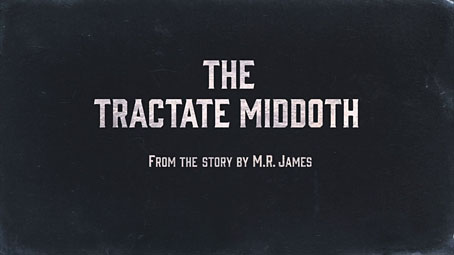
The recent interest in the BBC’s Ghost Story for Christmas series has been a thing of mixed blessings, as is often the case when nostalgia fuels a reappraisal. On the one hand aficionados such as myself no longer have to hoard and swap rare tapes or video files now that the BFI has made all the films available on DVD; the interest in those films, and in similar works, has had the additional benefit of resurrecting related TV dramas and series such as Dead of Night (1972), and Leslie Megahey’s exceptional Schalcken the Painter (1979).
On the debit side, the revival of the series in 2005 has been a patchy affair, with results ranging from the very good (A View from a Hill), to the not-so-bad (Number 13), to the disgracefully bad (the 2010 adaptation of Whistle and I’ll Come to You). All these dramas continue the tradition of adapting stories by MR James, a writer whose work is now the first choice for any future stories in the series, and whose oeuvre overshadows that of other possible candidates for adaptation. Whether this last development is a good or bad one depends on your view of James’s fiction.
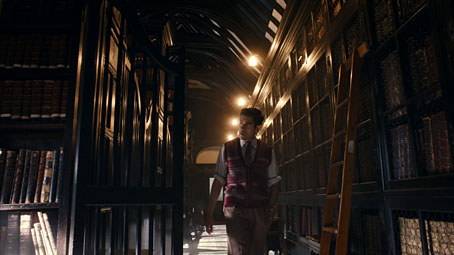
Sacha Dhawan among the dusty tomes.
This year we had a new James adaptation, The Tractate Middoth, written and directed by Mark Gatiss, followed by an hour-long documentary about MR James which Gatiss presented. Gatiss and his League of Gentlemen colleagues have been vocal in their enthusiasm for the British film and television ghost story, and for its literary antecedents: last year the team contributed a commentary track to the recent reissue of Blood on Satan’s Claw; League writer Jeremy Dyson has an essay in the BFI’s DVD/BR release of The Innocents; Reece Shearsmith has recorded several readings of Robert Aickman’s superb short stories; Dyson directed, and Gatiss acted in, The Cicerones (aka The Guides, 2002), an adaptation of an Aickman story. The latter was well-intentioned but a short running time combined with a very literal transcription of Aickman’s ambiguities made for a disappointing end result. The Cicerones made me apprehensive for what we might see with The Tractate Middoth but I’m pleased to report that all concerns were unfounded: Gatiss’s film is not only the best MR James adaptation since The Ash Tree (1975) but is the best film in this series since The Signalman in 1976. (Although Schalcken the Painter was screened during Christmas 1979 it wasn’t intended as a continuation of the Christmas ghost stories.) This bodes well for the future of the series, and confirms the importance of having a writer and director with a sympathy for the material.
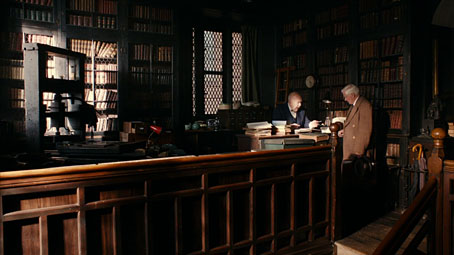
Roy Barraclough and John Castle.
The Tractate Middoth (1911) is a story with a splendid title but isn’t one of James’s best pieces. The tract in question is a cursed volume of Hebrew scripture in which a will has been hidden. James’s sketchy prose style manages to avoid detailing the elaborate machinations required to make this posthumous piece of ill-will effective; there’s a coincidence in the middle of the story that’s so clumsy even Charles Dickens would think twice about using it, while the character manoeuvres at the climax are just as clumsy but get by simply because it’s the end of the story. Given this, it’s a surprising choice for a television adaptation. I’d guess it was chosen in part because it concerns a book (Gatiss is also a successful novelist) and has a library as a setting. It’s also one of the few James stories to feature a female character who isn’t a servant, while the ghost is rather more tangible than some of those that lurk in the thickets of the author’s prose.
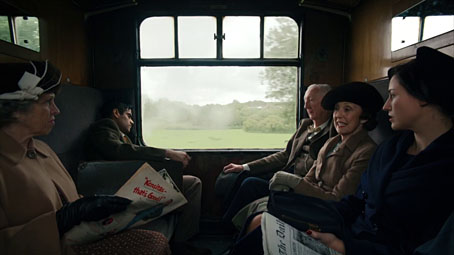
A thesis might be written about the recurrence of branch-line railways in the fiction of MR James. Una Stubbs is second from the right.
The production updates the story to the 1950s, remote enough to be firmly in the past but not too close that modern technology need intervene. Sacha Dhawan is William Garrett, the young librarian given the task of locating the sinister volume. The rest of the cast is filled out by a number of excellent character actors: John Castle (who appeared in the Dead of Night series), Eleanor Bron, Una Stubbs, David Ryall (from The Woman in Black), and Roy Barraclough who brings some life and humour to another of James’s poorly written lower orders. Gatiss fleshes out these ciphers very effectively considering how little there is to go on in the text. More importantly, he accumulates the necessary sense of dread to a degree which—for this viewer at least—exceeds that of the written work. The clumsy manoeuvres at the end are still present, however, and they left me wondering whether another writer could have made the climax work with more conviction. MR James was a writer but he wasn’t a dramatist.
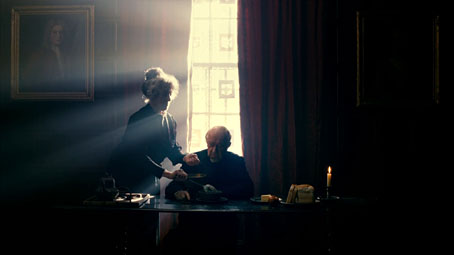
Eleanor Bron and David Ryall.
The Tractate Middoth is still available for viewing on the BBC’s iPlayer, as is MR James: Ghost Writer, Mark Gatiss’s documentary. For a different take on the story there’s The Lost Will of Dr. Rant (1951), a US TV production for the Lights Out series. Leslie Nielsen stars as Bill the librarian in a film which is one of the earliest James adaptations of them all.
Previously on { feuilleton }
• Nigel Kneale’s Woman in Black
• Schalcken the Painter revisited
• Robin Redbreast by John Bowen
• The Stone Tape
• “Who is this who is coming?”

This is one of James’s weakest stories and I had no great hopes for it as a television piece. In the event, I found the quality of the acting just about overcame the inadequacies of both the original tale and Gatiss’ script and direction – John Castle is always good value and Sacha Dhawan (new to me) was excellent. But…there were no scary moments, although whenever the flakes of Dr Rant’s posthumous dandruff appeared floating through shafts of sunlight one felt a hopeful dread, never alas to be fulfilled. (The ghost’s face was revealed far too early in the story.)
Presumably because of the way the original story peters out, Gatiss added the last scene showing the Simpsons taking possession of Rant’s house, unaware of the shadow looming behind them (and the spider motif briefly reappeared, too). That, at least, was an improvement on James!
BTW, the story was first adapted for British television as one of the early episodes of ITV’s intermittent Mystery and Imagination series (1966-1970). According to The Times reviewer it had “an effective visual horror for the dead but ubiquitous clergyman…[and] was given precise period values by all its players.” Despite the series’ popularity, almost all its 20-odd episodes were wiped, The Tractate Middoth among them….
I liked the bit on the train, and since I don’t watch a great deal of TV any more it’s always good to find that some of those older actors are still working. I also thought the shadow at the end was a good touch, rather like the end of A Warning to the Curious where it’s obvious that Clive Swift’s character won’t get away with knowing where the crown is buried.
I think this one suffered slightly from the self-consciousness which has made the revived Doctor Who insufferable and unwatchable. It’s a persistent problem when you’re dealing with popular material that has a ready audience. Gatiss wasn’t winking at the audience the way too many film and TV writers do but it could easily have gone that route. I wouldn’t mind them dropping MR James for another writer in future, that way there wouldn’t be the problem of working in the shadow of earlier productions.